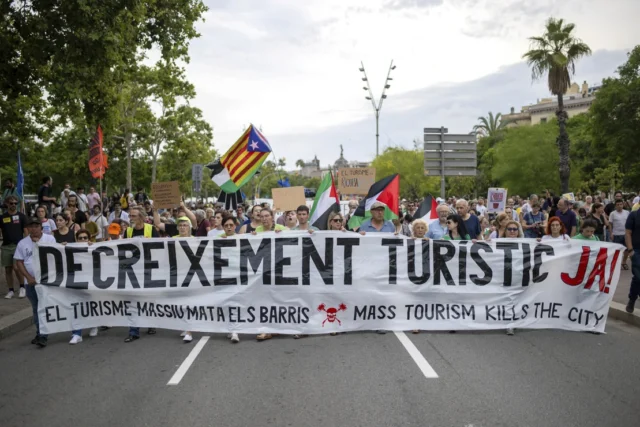Introduction: Barcelona anti-tourism protest
Barcelona, one of the most visited cities in Europe, witnessed a significant anti-tourism protest on Saturday. Thousands of demonstrators took to the streets, expressing their frustration with the impacts of mass tourism. Equipped with water pistols, protesters squirted water at tourists and carried signs with slogans such as “Barcelona is not for sale.” This demonstration reflects the growing discontent among residents regarding the adverse effects of tourism on their daily lives.
Mass Demonstration Against Over tourism
According to Barcelona’s City Council, approximately 2,800 people participated in the protest in the city’s center. This event is part of a larger movement against mass tourism in Spain, with similar protests occurring recently in the Canary Islands and Mallorca. The primary concerns raised by protesters include the rising living costs and the declining quality of life for locals due to the influx of tourists.

Organizers and Their Objectives
The demonstration was organized by the Assemblea de Barris pel Decreixement Turístic (Neighborhood Assembly for Tourism Degrowth), a coalition of over 100 local organizations. This group advocates for a significant reduction in the number of tourists visiting Barcelona. They argue that mass tourism leads to increased prices, strains public services, and exacerbates social inequality. The group has proposed 13 measures to address these issues, including:
- Closure of Cruise Ship Terminals: This aims to reduce the environmental and infrastructural burden on the city.
- Regulation of Tourist Accommodation: Stricter regulations to control the number of tourist accommodations.
- End to Public Spending on Tourism Promotion: Redirecting funds to support local communities instead of promoting tourism.
Economic Impact of Tourism in Barcelona
Official figures reveal that nearly 26 million visitors stayed overnight in the Barcelona region in 2023, contributing €12.75 billion ($13.8 billion) to the local economy. However, the Assemblea de Barris pel Decreixement Turístic contends that the profits from tourism are unevenly distributed, primarily benefiting large corporations rather than local residents.
Government Measures and Criticisms in Barcelona anti-tourism protest
Barcelona’s Mayor, Jaume Collboni, has recently introduced several measures to mitigate the negative impacts of mass tourism. These measures include:
- Increased Nightly Tourist Tax: The tax has been raised to €4 ($4.30) per night.
- Limit on Cruise Ship Passengers: This aims to reduce congestion and environmental strain.
- Ending Apartment Rentals for Tourists by 2028: By phasing out short-term rental licenses for over 10,000 apartments, the city hopes to make housing more affordable for long-term residents.
Despite these efforts, Collboni has faced criticism for allowing high-profile events such as a Louis Vuitton catwalk show in Parc Güell and the upcoming America’s Cup sailing competition. Critics argue that these events further contribute to over tourism and undermine the city’s efforts to control it.
Similar Protests Across Spain
The discontent in Barcelona mirrors similar protests in other parts of Spain. In April, residents of the Canary Islands mobilized against excessive tourism, citing skyrocketing housing prices and environmental damage. These protests reflect a broader trend in many popular tourist destinations worldwide, where residents are increasingly vocal about the adverse effects of overtourism.

Global Context of Over tourism in Barcelona anti-tourism protest
Over tourism is a global issue affecting numerous tourist hotspots. The resurgence of the travel industry post-pandemic has led to record visitor numbers in many locations. While tourism boosts local economies and benefits hospitality businesses, it also has significant downsides, including:
- Increased Noise and Pollution: High tourist numbers lead to more noise and environmental pollution.
- Traffic Congestion: An influx of visitors causes traffic jams and overcrowding.
- Strain on Resources: Public services and infrastructure are often overburdened by tourists.
- Lower Quality of Life for Locals: Residents face higher living costs and reduced access to amenities.
- Diminished Visitor Experience: Overcrowding can negatively impact the experience for tourists themselves.
Initiatives to Combat Over tourism
In response to the challenges of over tourism, many cities have implemented various measures to manage tourist numbers and mitigate their impact. These initiatives include:
- Tourist Taxes: Many destinations have introduced or increased tourist taxes to generate revenue for managing tourism-related issues.
- Campaigns Against Problematic Visitors: Awareness campaigns aimed at promoting responsible tourism behavior.
- Attendance Caps at Attractions: Limiting the number of visitors to popular sites to prevent overcrowding.
Conclusion: Barcelona anti-tourism protest
The recent anti-tourism protest in Barcelona underscores the growing tension between the benefits of tourism and its adverse effects on local communities. As cities like Barcelona grapple with the challenges of overtourism, it is crucial to find a balance that allows for sustainable tourism while preserving the quality of life for residents. The measures proposed by the Assemblea de Barris pel Decreixement Turístic and the steps taken by the city government represent important efforts toward achieving this balance. However, continued dialogue and cooperation between stakeholders are essential to ensure the long-term sustainability of tourism in Barcelona and other affected destinations.
By addressing the concerns of local residents and implementing effective strategies to manage tourism, cities can create a more sustainable and equitable environment that benefits both locals and visitors.











